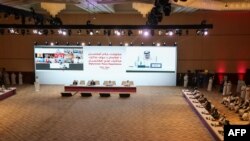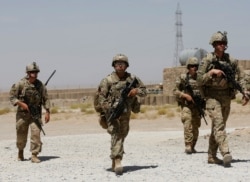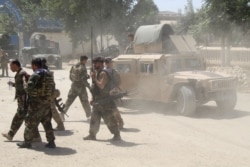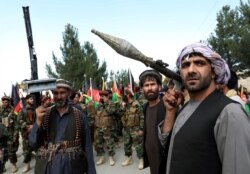Qatar says it has formally proposed to warring sides in Afghanistan to agree to a third-party mediation for moving their stalled peace negotiations forward and reaching a power-sharing arrangement before U.S.-led foreign troops complete their exit from the country by a September 11 deadline.
The proposal comes ahead of Friday’s crucial meeting between U.S. President Joe Biden and Afghan President Ashraf Ghani and his chief peacemaker, Abdullah Abdullah, at the White House. Biden is expected to encourage all Afghan parties to “meaningfully” negotiate an end to their country’s long conflict.
Mutlaq bin Majed Al Qahtani, the special Qatari envoy for counterterrorism and mediation of conflict resolution, said his government shared the mediation proposal last week with representatives of the Afghan government and the Taliban insurgency. He made the remarks during an international seminar this week in Qatar’s capital, Doha.
The two Afghan adversaries have been holding peace negotiations in Doha since last September with the host government, among others, playing the role of a facilitator. But the process has made no significant headway, with each negotiating team blaming the other for the deadlock.
“We do not think facilitation is enough. [Afghan negotiators] need a formal mediation,” Qahtani said on Monday.
The seminar’s organizer, the independent Doha-based Center for Conflict and Humanitarian Studies, released video of his speech Thursday.
“The [two Afghan] parties have not yet finalized their agreement with respect to the mediation. One party needs two mediators while the other party needs one mediator,” the Qatari envoy said, without elaborating. “We expect the parties to come to us very, very soon about their final position. They are almost there.”
Qahtani said the mediator’s opinions, decisions and proposals would not be binding on the Afghan parties, but he did not say who would conduct the proposed mediation.
The Qatari official stressed, however, it should be an “impartial mediator that understands the cultural sensitivity of the conflict” to help the Afghan parties reach a peace settlement “in full conformity of the international law.”
Doha, which houses the Afghan Taliban’s political office, served as the venue for Washington’s negotiations with the insurgents that produced the February 2020 landmark troop withdrawal agreement and set the stage for the U.S. to close its nearly two decades of military engagement in Afghanistan.
The peace talks between the Taliban and the Afghan government stemmed from the U.S.-Taliban deal. The pact also binds the insurgent group not to allow terrorist groups to use Afghan soil for attacks against the United States and its allies.
Deadlocked intra-Afghan talks
Qahtani explained the deadlock in intra-Afghan talks primarily stems from major disagreements on how Afghanistan would be governed following the withdrawal of foreign troops.
“Any kind of system you want to call it. any kind of name you want to put forward, I think it’s up to them. What's more important is about the power, it’s about the system, it is about the future government,” he said.
The Taliban reject Ghani’s government as an illegal entity and a product of U.S. occupation of Afghanistan, demanding a new “Islamic system” of governance in Kabul. The Afghan government maintains the country is being run under an Islamic constitution and any transition would have to be in line with the existing laws.
“I confirm that we received a proposal from the Qatar Foreign Ministry about Qatar’s role as mediator,” Taliban spokesman Suhail Shaheen told VOA. “This is now under discussion in our negotiations team and we will send them our response soon after our deliberations,” said Suhail, who is based in Doha and is also a member of the Taliban negotiating team.
VOA could not immediately get a confirmation from the Afghan government about whether it had received Qatar’s proposals and what its response might be.
Taliban territorial control
The Taliban have dramatically expanded their area of control since the foreign military pullout formally began on May 1, seizing dozens of districts. The United Nations estimated on Tuesday that more than 50 Afghan districts had fallen to the insurgents since the beginning of May.
Afghan security forces have also escalated counteroffensives and the ensuing fighting has killed hundreds of combatants on both sides.
The violence has fueled fears the withdrawal of international forces without a peace deal could plunge Afghanistan into another round of bloody civil war and chaos.
The top U.S. military commander on Wednesday, however, downplayed recent insurgent gains, saying that most of the district centers controlled by the Taliban were seized before American troops began withdrawing from Afghanistan.
Chairman of the U.S. Joint Chiefs of Staff General Mark Milley, while testifying before the House Armed Services Committee this week, acknowledged the Taliban were “sniping at and picking off outposts” and they have also seized some district centers.
“There’s 81 district centers that are currently, we think, underneath Taliban control. That’s out of 419 district centers. There is no provincial capital that is underneath Taliban control, and there’s 34 of those,” said Milley.
“Sixty percent of the 81 were seized last year and the others since the last two months or so. So, yes, we are concerned, we are watching it, but there is a 300,000-plus or -minus military force, Afghanistan army and police force, and it is their job to defend their country,” he added.
Washington, Afghanistan’s immediate neighbors and regional countries, including Qatar, have urged the Taliban to reduce violence and seek a political settlement to the war. They have warned that attempts by the insurgents to seize power militarily would be unacceptable for the global community.
A White House statement said earlier this week that Friday’s Washington visit by Afghan leaders “will highlight the enduring partnership between the United States and Afghanistan.”
But the Taliban have criticized Friday’s White House meeting between Biden and Ghani.
“It seems his visit is more for prolongation of his power rather than peaceful solution of the Afghan issue,” said Taliban spokesman Suhail. “It is in the interest of the U.S. to focus on a peaceful settlement of the issue instead of bolstering a moribund regime.”







